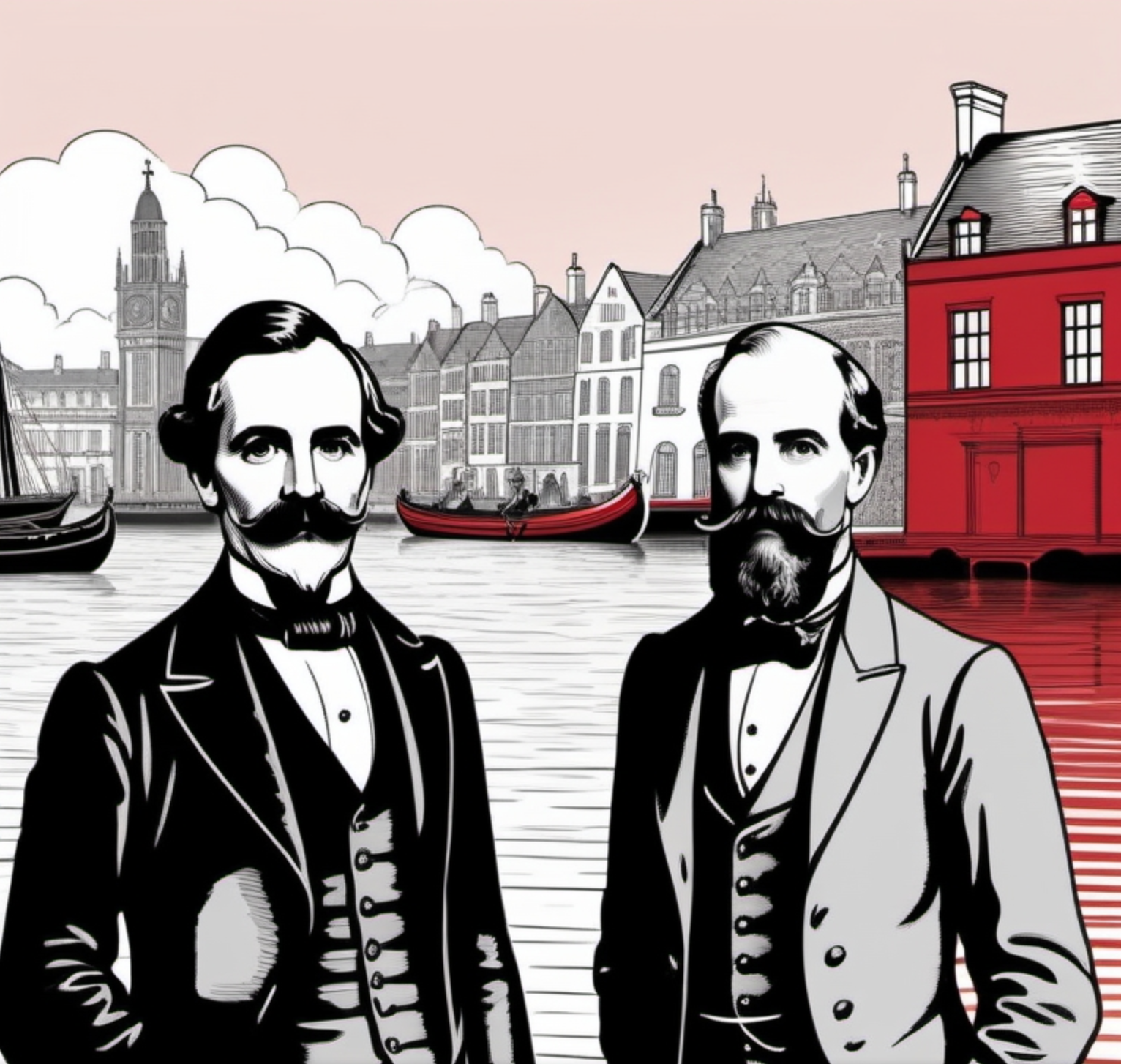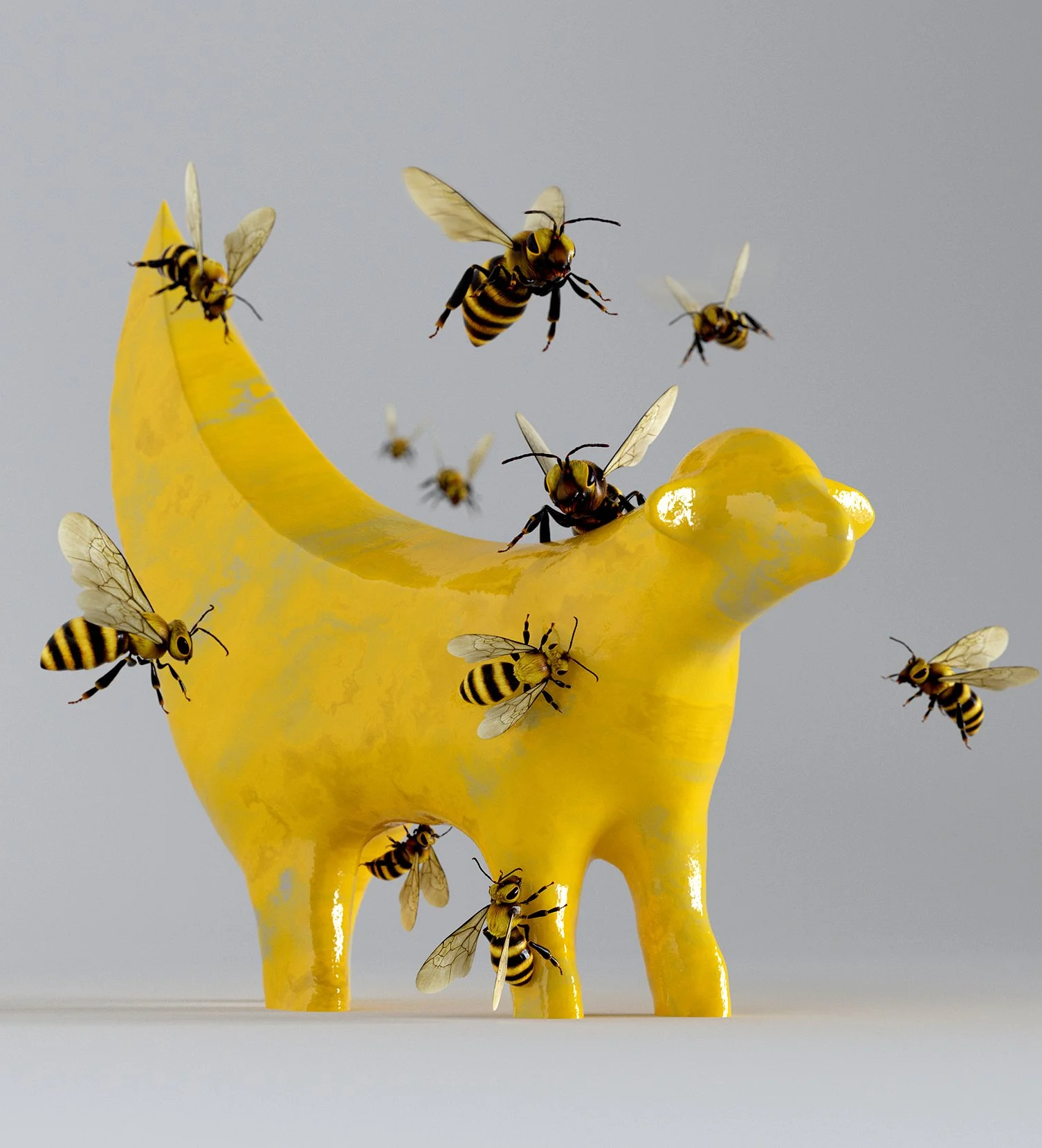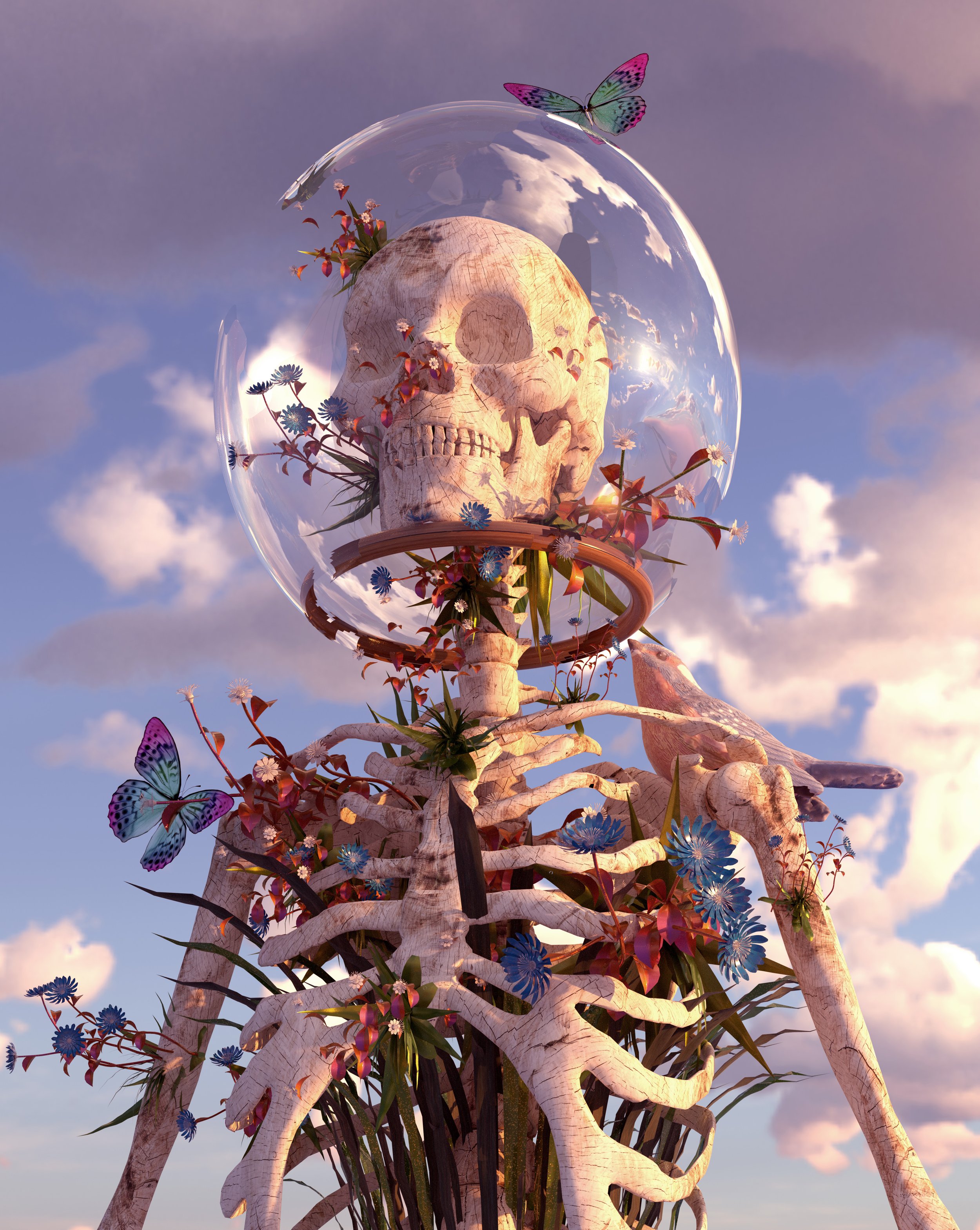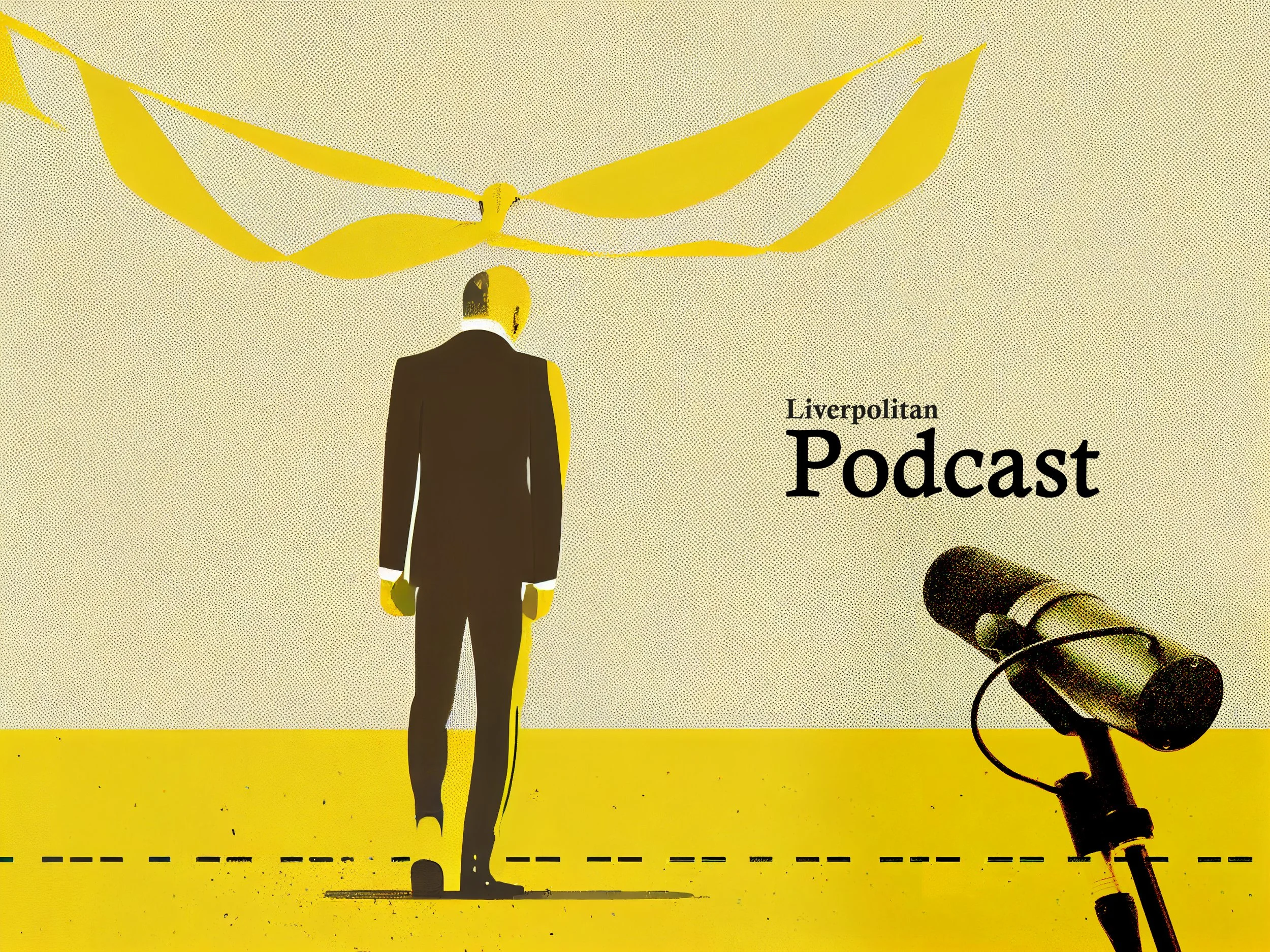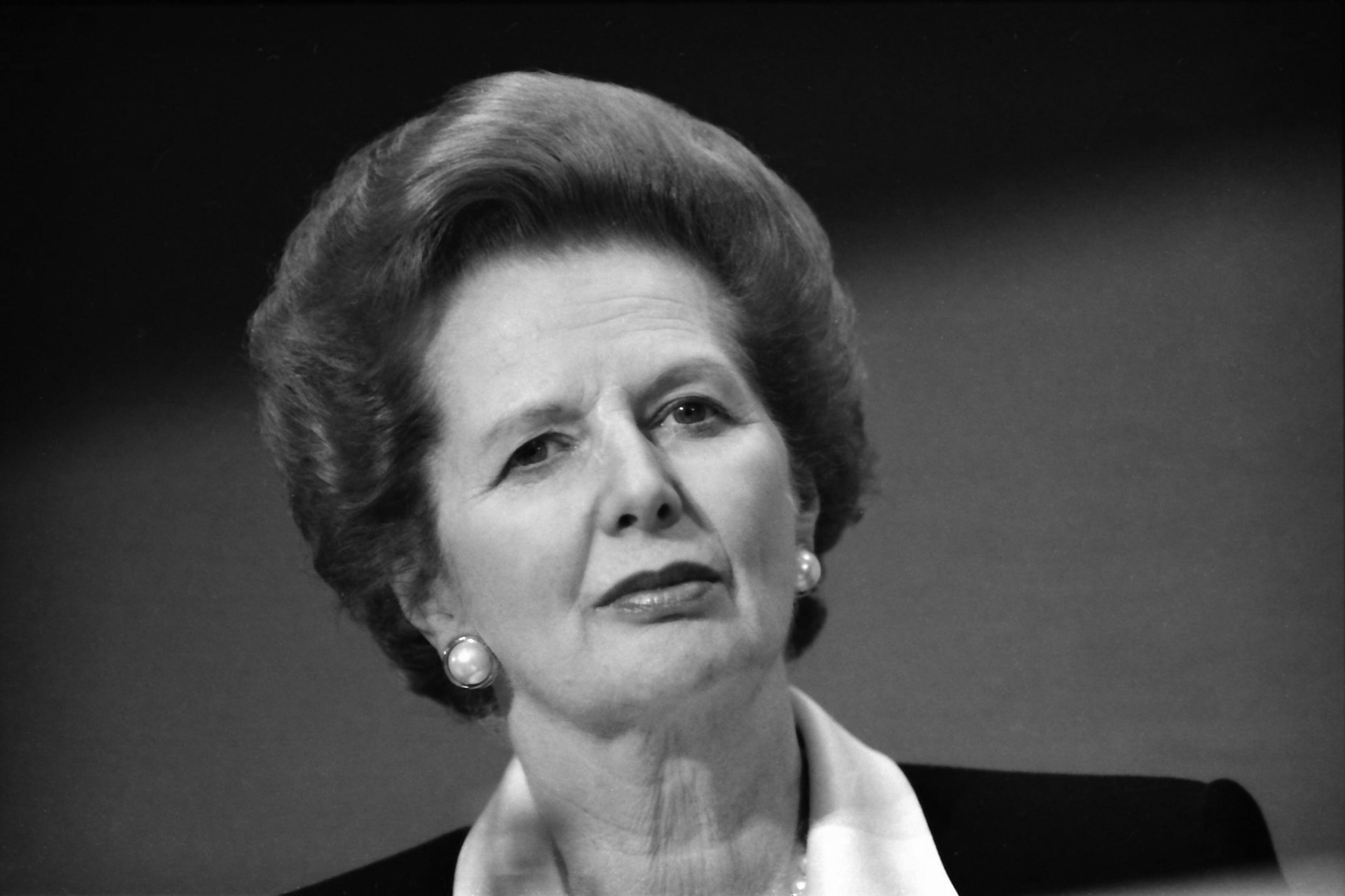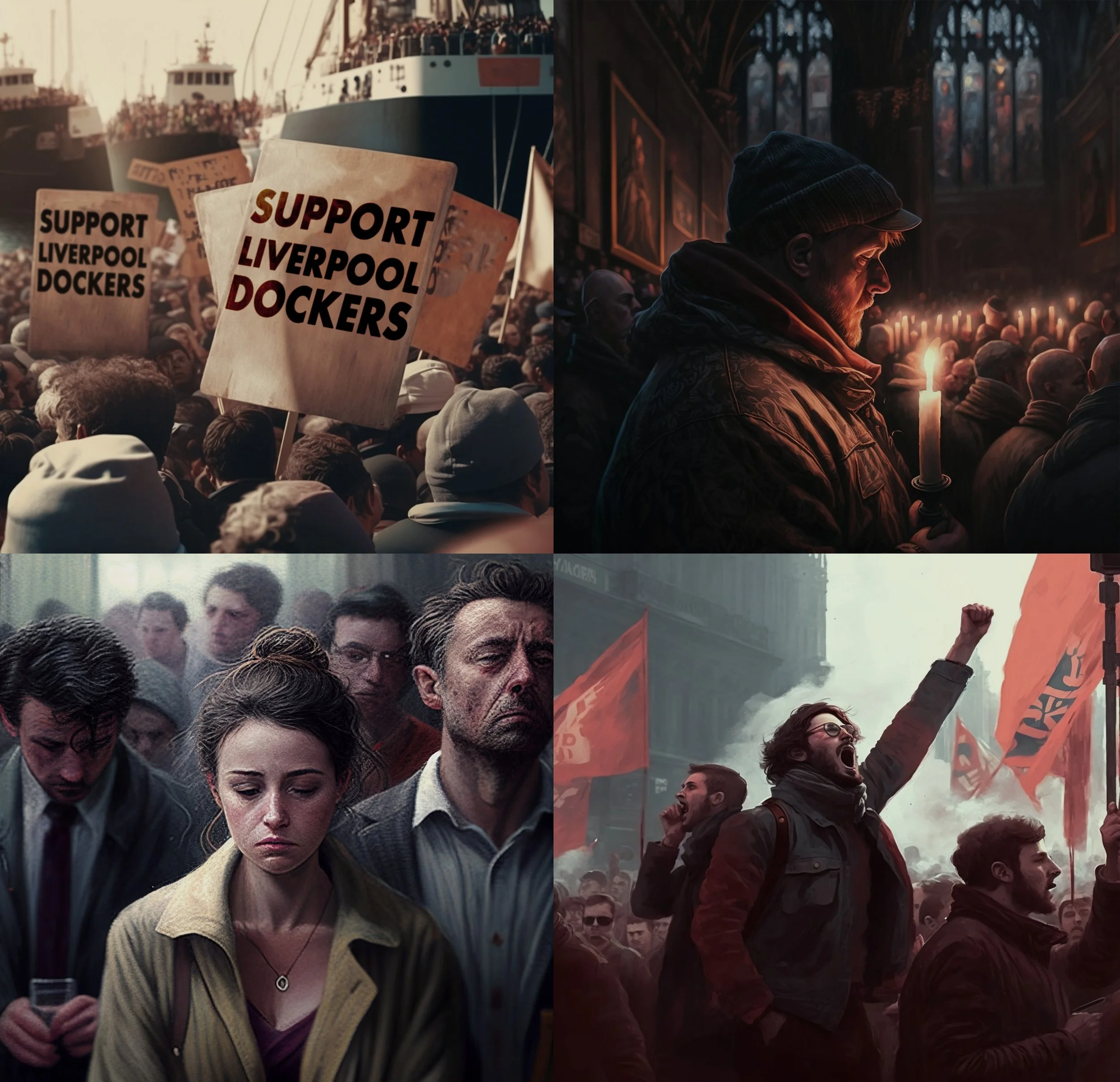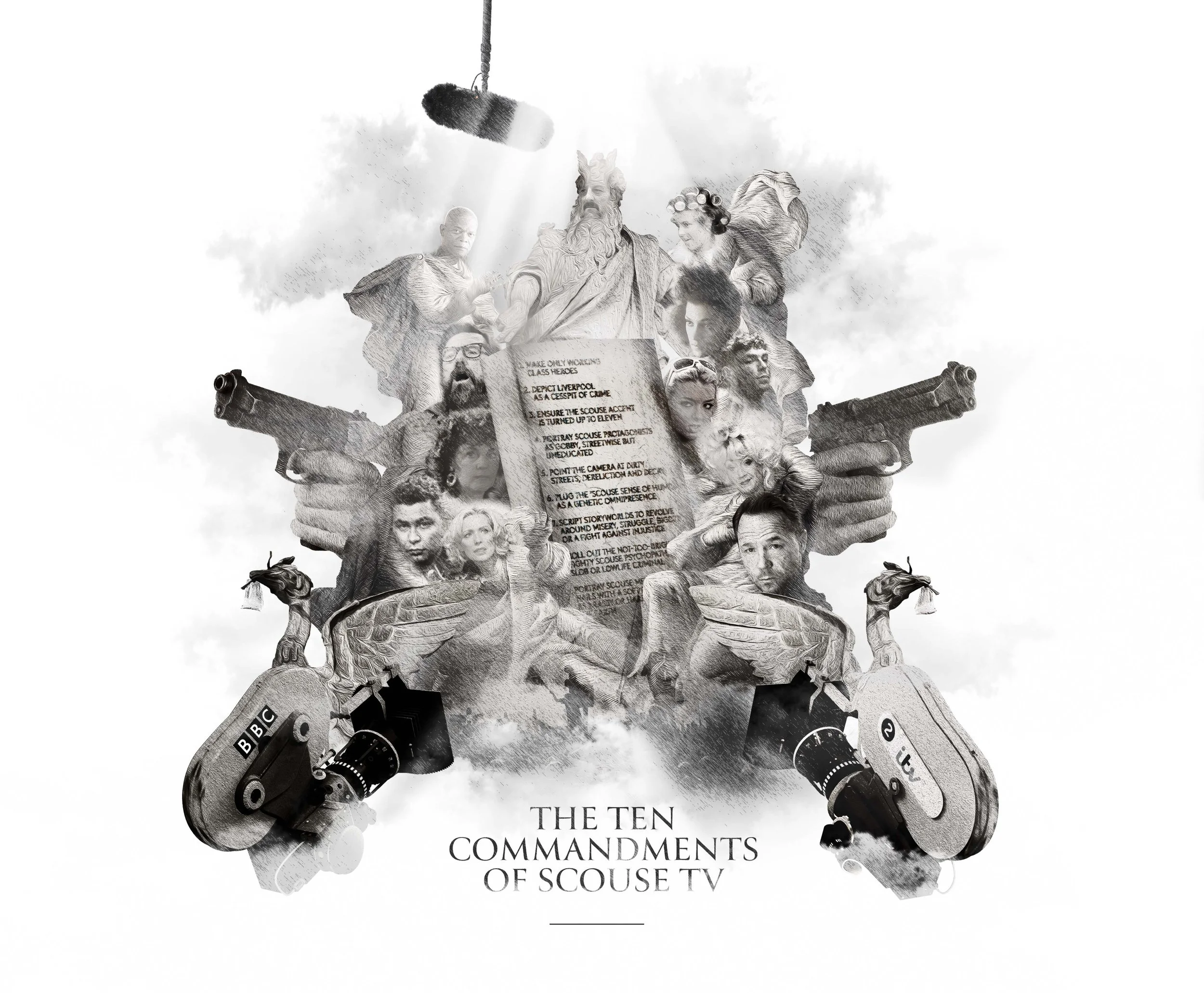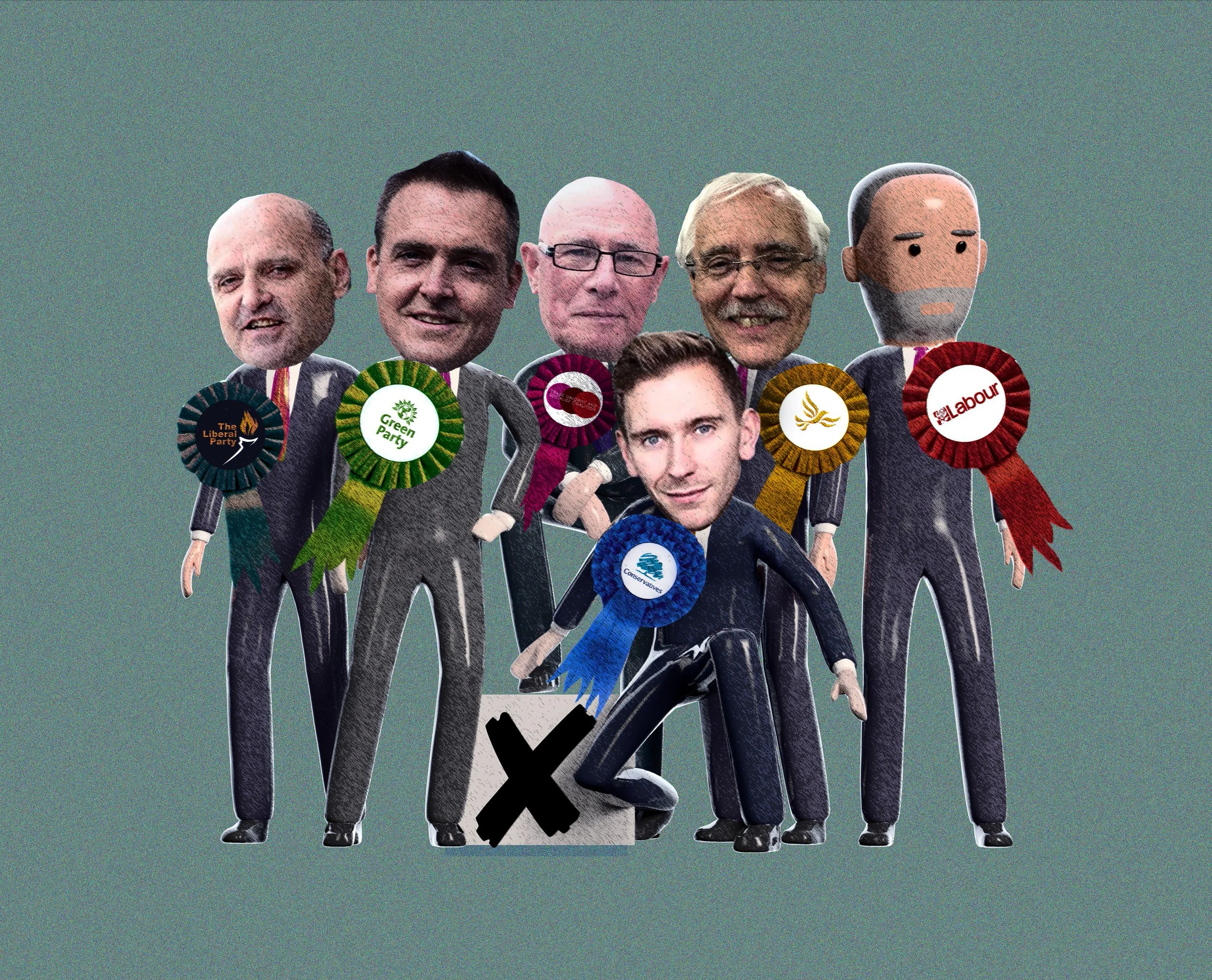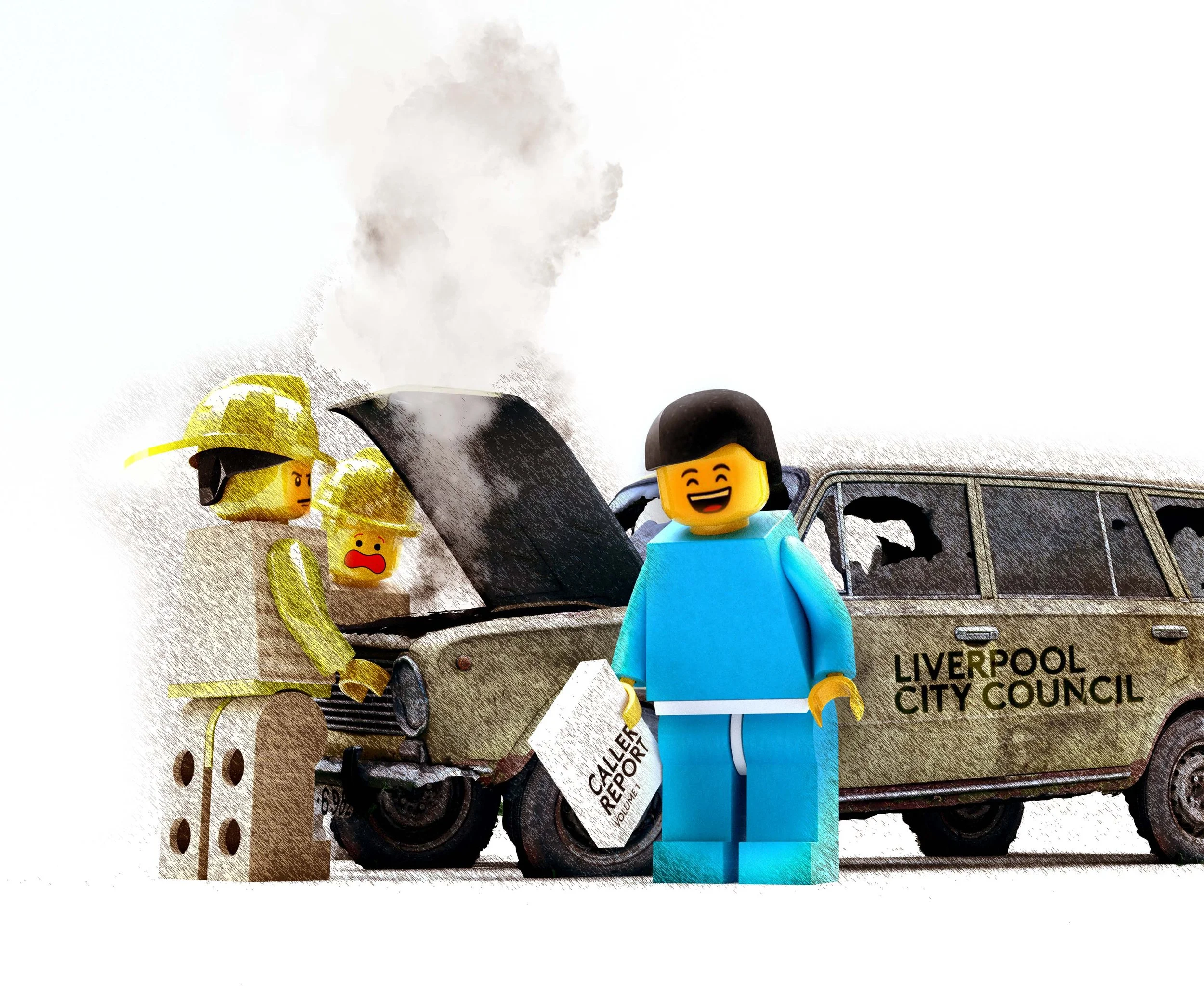Recent features
The Ten Commandments of Scouse TV and Film
“Another crime drama for Liverpool. Original,” we’d posted. Queue shitstorm. Tony bit back and all hell broke loose. Actors, producers, godknowswhosers leapt in intent on tearing us a new one, and presumably to make Tony feel better. But it was too late supposedly. We’d taken the shine off his achievements. Bubbles had been burst.
(How Liverpool stereotypes shape our media)
Paul Bryan & Michael McDonough
“Ignore the non-creative, faceless, nameless, self-appointed prick Tony. Imagine someone in New York (with all its crime stories) taking that same lazy, blinkered view. There’s a dark side to our city - anyone who doesn’t accept that is in denial. Well done & good luck mate.”
Dave Kirkby, a Writer/Producer/Director on Twitter
The Tony in question was Tony Schumacher, the screenwriter of new Liverpool-based BBC cop drama, The Responder, which stars Martin Freeman as a morally compromised Urgent Response Officer working the night-time crime shift. According to the Guardian, we can look forward to seeing the policeman pinch cigarettes and food off the dead while battling local drug barons. The show airs on the 24th January 2022.
Tony was not happy and to be fair, Liverpolitan had something to do with that. We’d spoilt his day, we were told, with a tweet of our own. It was maybe a little bit naughty.
“Another crime drama for Liverpool. Original,” we’d posted. Queue shitstorm. Tony bit back and all hell broke loose. Actors, producers, godknowswhosers leapt in intent on tearing us a new one, and presumably to make Tony feel better. But it was too late supposedly. We’d taken the shine off his achievements. Bubbles had been burst. You can check out all the fun here.
Based on the strength of the reaction, there was the distinct feeling that we’d touched a raw nerve. Are film and TV producers, writers and directors aware of just how often they go to the same well, selecting from the small set of go-to tropes and narratives that depict the city as the land of desperation rather than opportunity? We’re bored of it. Bored of seeing Liverpool as a metaphor for the down at heel, for crime and unsafe streets. For plucky, gobby underdogs struggling to keep their heads above water. There’s got to be different stories to tell.
But weren’t we being unreasonable or unkind? After all, we hadn’t even seen the show yet – just the trailer, the star interviews, and the press coverage, which seemed to major on how hard Freeman had worked to perfect his scouse accent. Marvellous. Wouldn’t want to get that wrong.
We’re bored of it. Bored of seeing Liverpool as a metaphor for the down at heel, for crime and unsafe streets.
BBC Trailer for ‘The Responder’
The truth is, The Responder could be the best British TV show ever written (and we hope it is) and it wouldn’t make a blind bit of difference. We’ve walked this path many times before. That’s not to say Liverpool doesn’t have real social problems. Of course it does, just like any other major city. And we’re not saying people shouldn’t write about them – everyone’s got to make a living, but what you really notice is the absence of alternatives and the laser-like focus on suffering. And what happens when the same kinds of story and the same kinds of characters get rolled out time and time again? How do the scouse stereotypes impact the way the world sees us? Or even more worryingly, how we see ourselves.
But’s let’s park that discussion for a minute because we need to make a point. Liverpool is, as many readers will know, a popular filming location. Everything from The Batman to Peaky Blinders and The Crown have been filmed here in recent years and many more productions besides. The Liverpool Film Office claim the city is the most filmed UK location outside of London. It’s an undoubted achievement. But the truth is, Liverpool tends to act as a stand-in for other places – notably New York and London, rather than as a setting itself. This is no doubt testimony to its incredible architecture and urban landscape. But what this does mean, is that the cultural imprint of Liverpool is often invisible on the screens. Unless you were in the know, you’d have no clue you were seeing the north’s best city. So when assessing how Liverpool is represented in film and television drama you can disregard all of those productions. You need to look at shows that are set here and you need to look at Liverpool characters that appear in other programmes located elsewhere. It’s the only plausible way you can do it.
And the mind naturally turns to Stephen Graham, that quite brilliant actor who is nevertheless, a one-man industry in televisual scouseness – the close-cropped hard man with the inner vulnerability. He is screen-gold, no doubt about it and we’re huge fans. He is unreservedly a fantastic asset to the city, whose name will be forever synonymous with Combo, the fascist scouse skinhead from This is England, perhaps only rivalled in intensity by Robert Carlyle’s scouse football-obsessed racist psychopath in Cracker.
I guess we need to put our money where our mouth is. Tony Schumacher seemed to think there hadn’t been any crime drama set in Liverpool since 2012. But our yardstick is wider. Here’s a list of crime or crime-related dramas that have been set in Liverpool or featured major stereotypical scouse characters – Waterfront Beat (1990), Cracker (1994), Liverpool 1 (1998), Lock Stock and Two Smoking Barrels (1998), Going Off Big Time (2000), 51st State (2001), This is England (2006), Good Cop (2012), Little Boy Blue (2017), Tin Star (2020), Time (2021), The Responder (2022).
Of course, we’re only really touching the surface here.
Benidorm (2007-18) featured a whole plethora of dodgy scousers on the rob, Coronation Street has never been shy to play the thieving scouse card either. Who can forget Jackie Dobbs, Diedre Rashid’s classic Liverpudlian prison cellmate. Then we’ve got the crafty lazy type – Lister from Red Dwarf (1988-2020), a self-described bum, and Jim Royle of The Royle Family (1998-2012), the cynical, albeit amusing slob. England’s most incompetent manager ever was also a scouser in Mike Bassett, England Manager (2012). We’ll steer clear of Harry Enfield … All of them had a flexible moral code when it came to the law (with the possible exception of Mr Bassett). We can’t help but feel we’re missing other examples – Boys From the Blackstuff (1982), Blood on the Dole (1994), Bread (1986-91). Hell even the C4 series, The £1 Houses: Britain’s Cheapest Street (2018) had to feature regular shots of feral-looking kids.
What you really notice is the absence of alternatives and the laser-like focus on suffering. How do the scouse stereotypes impact the way the world sees us? Or even more worryingly, how we see ourselves.
Now we want to make absolutely clear, this is not about passing judgement on whether TV shows are any good. There are clearly some classic stories and memorable characters here. Neither is it about advocating for only ‘positive’ portrayals like some latter-day Mary Whitehouse protecting the nation’s morals. Creators should be free to fly wherever their muse takes them including to the darkest of places. Writers should feel no obligation to tell any kind of story unless it’s an imperative they feel within themselves. Nothing is off limits as far as Liverpolitan is concerned and we are wary of those who want to place limits on expression in pursuit of other political goals. We will not put forward the case for restrictions on the use of regional stereotypes by co-opting the kind of representation arguments employed in matters of protected characteristics. Creatives have enough on their plate as it is.
But the question stands, why when it comes to Liverpool, do certain types of narrative and certain types of character re-occur over and over again? And this goes way beyond crime. That’s only a subset of the cliches. In addition to the drug dealers and gangsters, lazy slobs, dirty cops, jailbirds and grifters we have the more scouse-than-scouse; the images of decay and struggle; of hard-men and gold-hearted working class women (only working class is allowed if you want to be a hero) striving to overcome the limitations of an oppressive place that wants to beat them down and crush them. Sometimes, if we’re lucky we get the positive spin version, where ‘authentic’ people find happiness or social solidarity in the most unexpected places, despite ‘the system’ and the limitations of their surroundings. Liverpool characters are typically portrayed as ‘street-wise’ and ‘gobby’, which is something I guess we’re supposed to take pride in, but less so do we see them as educated or refined (the entire premise of Educating Rita was based on the unlikeness of a scouser going to university). Often, they are just one heart-beat away from kicking-off, sometimes saved from eruption by that omnipresent scouse ‘sense of humour’. Throw in the name checks to the Reds, Blues and Beatles and the lingering shots of discarded shopping trolleys and the rain-soaked terrace houses where everyone is supposed to live and it’s hard to escape the feeling that we’ve seen it all before. That those creating or commissioning shows are themselves suffering from some kind of block, a collective failure of imagination. It most probably doesn’t help that most (all?) commissioners are located elsewhere, but the truth is many of our own sons and daughters seem all too happy to play this game. They may be wonderfully talented professionals who can play or write characters with nuance and all power to their elbow. But maybe we should try a little harder to look outside the model and imagine different kinds of stories. When is Liverpool going to get its own When Harry Met Sally? (not the coke-snorting edition). I’d even take a horror - the Williamson Tunnels lend themselves to finding a monster in the deep. You can have that one for free.
Of course, the question naturally arises, whether any of this is important. Are we exaggerating the significance of dramatic media portrayals in shaping external perceptions of the city? And even if they did have an influence, does it matter? Does the way a region and its people are viewed have any impact on real-life outcomes? How credible is it to say, as we suggested in the online debate, that fictionalised accounts of crime, depravation and struggle when incessant impact business investment decisions? Surely that’s a nonsense?
This stuff is always hard to prove and it’s easy to mock. As one exasperated Tweeter said in the Schumacher clash, “If crime dramas damaged a city's reputation then New York would never see a tourist.” Perhaps stretching the point, someone else made a similar argument about Costa Rica and the threat of Jurassic Park dinosaurs. But New York is not the debate-winning example they seem to think it is. For every NYPD Blue, there’s a Coming to America, Birdman, Jersey Girl and Breakfast at Tiffany’s. New York is an unofficial capital and home to powerful media empires. Its stories are legion and diverse, reflecting the vast variety of life in one of the world’s most important cities.
Creators should be free to fly wherever their muse takes them including to the darkest of places. Nothing is off limits. Liverpolitan will not put forward the case for restrictions on the use of regional stereotypes.
Liverpool’s media landscape consists of The Liverpool Echo and some broadcast journalists on loan from Manchester. Its biggest TV Production Company, Lime Pictures inspired the scripted reality nonsense that was Desperate Scousewives. It’s once ground-breaking soap opera, Brookside is long dead, and Richard and Judy fled back to the capital because TV guests didn’t fancy the trip up to the Albert Dock. The city is simply not in control of its own narrative. It eats what it’s fed and what it’s fed is the drip, drip, drip of bleakness and all too often criminality. It might make for good TV (if you like that kind of thing) but it’s depressing as hell, and it’s about as ‘real’ as a Potemkin village.
We can’t prove that a business looking to invest lets the latest Stephen Graham crime special outweigh what its spreadsheet calculations tell it, but we’ve been around long enough to know there’s a strong dose of subjectivity in the decisions people make. If all you’re ever told is Liverpool is the land of the desperate, how likely is it to make it onto your office relocation shortlist?
The perverse thing, if it is a thing, is to wonder to what extent these narratives become internalised by the city’s own people? Become part of our own self-image, heralded as truth as we play the fool. Do we start to celebrate our own stereotypes, and invent new stories that fit the ever decreasing circles of our imagination? It’s worth thinking about even if you end up dismissing it. At the very least, you should ask yourself, why Liverpool is never the setting for a romcom, or a political drama (God knows we give them the material – appreciative nod to Bleasdale’s excellent GBH (1991)) or any number of things that we don’t currently see. What exactly is going on in the heads of our commissioners?
So we’ve been doing some thinking about these fictional tropes and narratives that swirl around the city of Liverpool. We’re going to call them The Ten Commandments of Scouse TV and Film. There’s actually more, but 13 didn’t sound as snappy. So read on, we’re about to list them and let us know if you can think of any more. Oh, and for the avoidance of doubt, they are intended as satire, not tablets of stone. We named them, but they aren’t ours - they’re in the minds of those with the power to green-light, polluting our cultural soup.
But before we get to that, one final point. In our minds, when we were writing this, our intention was not criticism but rather a rallying call to creatives. It is time to set our imaginations free. To see the city of Liverpool not as others do, but as we do. In full technicolour. Let the new stories begin.
The Ten Commandments of Scouse TV & Film
Thou Shalt …
1. Make only working class heroes
‘Real’ heroism is measured in the absence of a bulging wallet or purse.
E.g. Letter to Breshnev, Boys from the Black Stuff, The Liverbirds; Bread
2. Depict Liverpool as a cesspit of crime
Coke wars, feral kids, dodgy police, prison officers and cons, murders, gangsters, hard-bitten opportunism, and an uncooperative and sullen populace. You get the picture.
E.g. 51st State, Blonde Fist, Tin Star, Little Boy Blue, The Responder, Good Cop, Liverpool 1, Going Off Big Time, Clink, Merseybeat, Z-Cars, Wired
3. Ensure the scouse accent is turned up to eleven
According to TV, every character from Liverpool speaks with the thickest of scouse accents because it’s ‘authentic’. If they didn’t, they’d be bracketed as a ‘snob’. Don’t expect to be hearing anyone that sounds like they might hail from Woolton or Crosby.
E.g. Almost every single show that ever featured a Liverpool character
4. Portray Scouse protagonists as gobby, streetwise but uneducated
The only higher education most scouse characters get is from the university of life. They grew up the hard way, on the streets, but they’re crafty or smart in their own way – not easily fooled. Schooled in conflict, they can always handle themselves verbally with fighting-talk, and if required with fists too. Always dreaming of better.
E.g. Educating Rita, Desperate Scousewives, Shirley Valentine, Benidorm
5. Point the camera at dirty streets, dereliction and decay
Phwoar, look at that, what a tip! But the poverty is ‘real’. Oh, and everyone lives in a terrace house up there.
E.g. The £1 Houses, 51st State
6. Plug the ‘scouse sense of humour’ as a genetic omnipresence
Everyone’s a wit. I mean, you’d have to be to live here.
E.g. Bread, Brookside, The Royle Family
7. Script storyworlds to revolve around misery, struggle, bigotry or a fight against injustice
Because that’s the sum total of life in Liverpool. Now, can I have a cappuccino with that?
E.g. Boys From The Black Stuff, Anne, Brookside, Blood on the Dole, Blonde Fist, Lilies, Secrets & Words, Hearts and Minds, Wired
8. Roll out the not-too-bright, fighty scouse psychopath, lazy slob or lowlife criminal
When you need a real nutter with a good line, who better than a scouser?
E.g. This is England, The Royle Family, Red Dwarf, Lock Stock and Two Smoking Barrels, Cracker
9. Portray scouse men as hard as nails with a soft centre, women as brassy or hard-worn salt of the earth
Everyone’s got a shield and everyone’s got a story. They do what they have to do to survive. But deep-down, they’re good people. Even when they are knocking you unconscious.
E.g. Brookside, Time, Line of Duty, The Street
10. Mention either football or the Beatles or both
Well you’ve got to haven’t you?
E.g. Doctor Who, Help, Cracker, Yesterday, Scully
Paul Bryan is the Editor and Co-Founder of Liverpolitan. He is also a freelance content writer, script editor, communications strategist and creative coach
Michael McDonough is the Art Director and Co-Founder of Liverpolitan. He is also a lead creative specialising in 3D and animation, film and conceptual spatial design.
Share this article
The Beatles: Inspiration or dead weight?
When does city pride in the Fab Four turn into a hindrance to future achievement? Jon Egan argues that the city of Liverpool is in danger of becoming a Beatles theme park, and its world conquering band a crutch to exorcise the painful intimations of our diminished relevance and prestige. In looking to the past, have we forgotten what made John, Paul, George and Ringo so special - their fearless embrace of the avant-garde, the contemporary and the new?
Jon Egan
There was something profoundly true and desperately sad in University of Liverpool lecturer, Dr David Jeffery's acerbic observation that "Liverpool is a Beatles' shrine with a city attached."
It is the dispiriting obverse to music journalist, Paul Morley's rhapsodic description of Liverpool as "a provincial city plus hinterland with associated metaphysical space as defined by dramatic moments in history, emotional occasions and general restlessness."
Jeffery's comments on Twitter appear to have been inspired or provoked by the recent announcement that Liverpool would be using a £2 million grant from Government to advance the business case for yet another "world-class" and "cutting-edge" Beatles' attraction on our hallowed waterfront. Presumably, it will be sandwiched somewhere between the Beatles statue and The Beatles Experience and conveniently close to The Museum of Liverpool and The British Music Experience with their not inconsiderable collections of Beatles artifacts and memorabilia. The exact nature of this new cultural icon remains a little unclear, however, amidst wildly differing descriptions offered by our City and Metro Mayors.
What is deeply depressing about this announcement is that it suggests that Liverpool is incapable of imagining any kind of cultural proposition that is not predicated on the seemingly inexhaustible allure of the four boys who shook the world.
There is of course a readily available and seemingly plausible justification for the never-ending Beatles' fetish, and that is the claim that they are the anchor for our hugely important tourism economy. Notwithstanding the implication that David Jeffery is right to suspect that the city is consciously morphing into a Fab Four theme park, I suspect that this is not exactly the whole truth. For Liverpool, The Beatles are a crutch, a cherished emblem of identity and importance used to exorcise painful intimations of diminished relevance and prestige.
In the novel, Immortality, Czech writer Milan Kundera tells the story of the man who fell over in the street, who on his way home stumbles on an uneven pavement, falls to the ground and arises dazed, grazed and dishevelled, but after a few moments composes himself, and gets on with his life. But unbeknown to the man, a world famous photographer happens to witness the scene and quickly snaps an image of the bewildered and bloodied pedestrian. He subsequently decides to make this picture the cover image for his new book and the poster for his international exhibition. For the man, a momentary misfortune freeze-framed, replicated and disseminated across the world, becomes the image that will forever define who he is.
The more we conflate the Beatles brand with the city's identity, the less space we have to imagine anything original, contemporary or remarkable.
In a sense, Liverpool is the City that fell over on the street, our external image is in significant part, defined by a succession of misfortunes, afflictions and tragedies that befell the city over two decades at the end of the last century. These events forged images, preconceptions and stereotypes that still blight us today and have never been successfully exorcised or replaced.
The Beatles hark back to a time before this blight, when Liverpool was in Alan Ginsberg's celebrated phrase, "the centre of consciousness of the human universe." They are, I believe, a therapeutic distraction from the task of making a different story or discovering a new identity.
Culturally, our Beatles fixation is unhealthy, debilitating and regressive. In fact, I fear we are reaching a point where The Beatles will become the single biggest impediment to any form of civic progression, or any serious project to make Liverpool important, interesting or relevant in today's world. If we are going to have a civic conversation about what kind of "world class" Beatles attraction should be erected at The Pier Head, my immediate impulse would be to recommend a mausoleum.
But perhaps a more imaginative and original idea was the one offered by the late Tony Wilson. That supreme Mancophile, Factory Records producer, Granada TV reporter and founder of the Hacienda nightclub was never held in particularly high regard in this city, especially following some tongue in cheek words of encouragement he gave to Club Brugge on the eve of their European Cup semi-final with Liverpool in 1977. Scousers may resemble elephants with respect to their prodigious powers of memory, but our skins can sometimes be just a tiny bit thinner. Tragically, Wilson's Mancunian persona and his tendency to lapse into casual profanity whilst presenting his project to civic decision-makers proved the undoing of his brilliant and visionary proposition for POP - the International Museum of Popular Culture. Pitched as the big idea for the European Capital of Culture, and the solution that would provide content for Will Alsop's audacious but otherwise functionless Fourth Grace, POP was a talisman for instant reinvention - a Beatles-inspired attraction without any reference to The Beatles. Alas it never happened.
Wilson had first dreamt of POP as an adornment for his own native city and a fitting celebration of its notable contribution to the history of modern popular music, but he soon realised that it was the right idea for the wrong place. He would often express irritation that when travelling in the US he would frequently have to explain where Manchester was by reference to its proximity to Liverpool - a place that people had actually heard of. And there was also the grudging recognition that at a time when Liverpool was "the centre of the human universe" globalising popular culture - Manchester could only offer us Freddy and The Dreamers. Even the outrageous charisma of Manchester United football god, George Best was derivative as he was often dubbed the 5th Beatle.
POP would not simply have been about popular music, it would encompass every facet of popular culture, every expression of contemporary creativity in film, TV, advertising, games, cars, sport, fashion, digital technology and consumer culture. And it was proposed for Liverpool because this was the place that spawned a phenomenon that reached the four corners of the Earth. It was a moment when the world discovered a common currency and a cultural vernacular intelligible to every ear.
POPs content would be dynamic and ever-changing, a continuous exposition of the new, curated by global creatives, designers and technologists. It would be Liverpool recovering its world city perspective and its capacity to invent and innovate - the pool of life, the birth canal for the extraordinary and the unprecedented. Its ingenious paradox was its implicit assertion that The Beatles did not make Liverpool, but Liverpool made The Beatles.
They monopolise our self-image occluding facets of identity and history now only half-glimpsed in the penumbra of a shadowy scouse dreamtime.
All of which is a million miles from Steve Rotheram's "world-class immersive experience" which he promises us will be more spectacular than a glass cabinet containing John Lennon's underpants. We can hardly wait.
If all we can possibly imagine are The Beatles etherealised into holograms - almost literally spectres from beyond the grave - then David Jeffery is right and Liverpool's once rich and cosmopolitan culture has collapsed into a black hole of redundant clichés. The more we inflate our Beatles offer and conflate their brand with the city's very identity, the less space we have in which to imagine anything original, contemporary or remarkable. Along with football (which at least tells new stories) they have come to monopolise both our external brand and our officially curated self-image, occluding facets of our identity and history that are now forgotten and suppressed, only half-glimpsed in the penumbra of a shadowy scouse dreamtime.
The Beatles have come not only to represent our brand, but have also helped to define our personality, attitude and accent - cheeky, chippy, sassy and defiant. As emblems of the 60s social revolution, they helped to forge and reify the idea of Liverpool as a working class city - or more accurately an exclusively working class city. As rock journalist Paul duNoyer, notes in his book, Wondrous Place, this is both a false and profoundly disabling imposition. Not only, as Tony Wilson asserted, are we the city that globalised popular culture, but we are a city that has contributed massively to every facet of culture, ideas and invention over the last 200 years.
The world's first enclosed dock and inter-city railway, together with the completion of the Transatlantic telegraph cable, are not only stunning achievements in technological innovation, but bolster the credible claim that globalisation began here.
The extent to which we have been willing to squander or disown the breadth of our cultural heritage was brought home to me in the febrile final stages of the European Capital of Culture bidding competition. Having commissioned pop artist, Sir Peter Blake to create a homage to his iconic Sgt Pepper album cover to remind the world, or at least the judging panel, of Liverpool's cultural and intellectual prowess, the task of deciding who exactly was worthy of inclusion was both fraught and enormously revealing. Apart from a few contemporary, and at the time highly topical creatives including the poet Paul Farley, artist Fiona Banner and film-maker Alex Cox, the principal criterion for inclusion appeared to be the directness or intimacy of connection to The Beatles. A lop-sided bias towards musicians, popular entertainers and Sixties icons meant no room for the likes of painters George Stubbs and Augustus John, poets Nathaniel Hawthorne and Wilfred Owen, novelist Nicholas Monsarrat, playwright, Peter Shaffer or even poet and novelist, Malcolm Lowry the author of the celebrated, Under the Volcano. Incredibly, until Bluecoat Artistic Director, Bryan Biggs' finally succeeded in persuading Wirral Council to erect a blue plaque on New Brighton's sea wall, there was virtually no public recognition that one of the 20th century's greatest and most influential novelists had any association with the Liverpool City Region.
Without questioning or diminishing the impact of the Mersey Sound poets (McGough, Henri and Patten) in the 1960s, their literary status is no way comparable to another unsung and forgotten cultural luminary with a significant Liverpool connection - C.P. Cavafy. Now acknowledged as one of the last century's most important and original poetic voices, Cavafy spent much of his childhood at addresses in Toxteth and Fairfield. Greek and gay, his poetry will forever be associated with the city of Alexandria where his family settled after leaving Liverpool. We do not know to what extent his formative years in the city helped nurture Cavafy's creative animus, but transience, up-rootedness and departure are woven into our narrative. Our sense of self and place in the world as Liverpolitans, owe as much to those who moved on, or merely passed through, as they do to those who stayed or settled here.
We are not, and never have been a monochrome canvass or a one trick city. Our culture is dense, deep and multifarious, formed by a hotchpotch of races, creeds and classes. For those tasked with defining a place and communicating its uniqueness to the world, there is always the temptation to reduce and simplify.
Brands, including place brands, are often conceived like Platonic forms - a distilled essence, fixed and immutable. But cities like Liverpool are neither simple nor static, and are thus frustratingly un-brandable. Described by Wilson as a place with "an innate preference for the abstract and the chaotic," our essence is pre-Socratic - unresolved, unpredictable and disconcerting. We know that port cities like Liverpool, Naples, Barcelona and Marseilles have historically been melting pots for ideas, influences and cultures - places where things never quite settled.
But their edginess is not merely a function of a perturbed diversity, it is also literal. It's connected to Marshall McLuhan's philosophical idea of right hemisphere sensitivity and the expanded perspective of what he terms acoustic space. Ports face outwards, they are perched on the precipice of a vast and formless abyss. It's an omnipresent reminder that there are no limits.
For Paul Morley, Liverpool’s character and identity - its ability to charm, entertain, inspire and infuriate - proceed from an inchoate restlessness and fidgety creativity. It's a place "where something happens, most of the time, leading to something else." But it seems like that creative energy and inventiveness have deserted us - or at least our leaders. What was once an animating pulse has been reduced to a piece of hollow rhetoric - a brand attribute.
It's sad that a UNESCO City of Music should have forsaken polyphony, and that we are continually stuck in a repetitive groove, narrowing our identity and stifling our capacity to be original (again). For this reason the very last thing Liverpool needs is yet another Beatles' attraction, even an immersive one.
So, OK, The Beatles were important, are important. They changed the world, but did they change Liverpool? We're still, I hope, the city capable of creating something else.
Jon Egan is a former electoral strategist for the Labour Party and has worked as a public affairs and policy consultant in Liverpool for over 30 years. He helped design the communication strategy for Liverpool’s Capital of Culture bid and advised the city on its post-2008 marketing strategy. He is an associate researcher with think tank, ResPublica.



